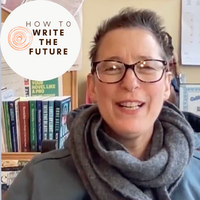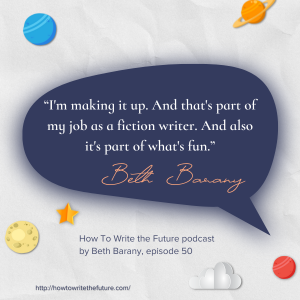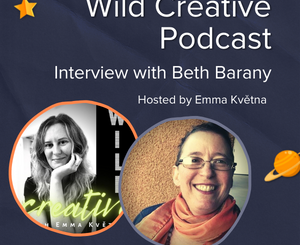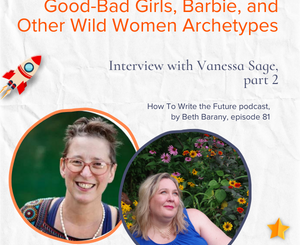Rules of Magic and Science Fiction Assumptions
Rules of Magic and Science Fiction Assumptions – How To Write the Future, podcast episode 50
“I’m making it up. And that’s part of my job as a fiction writer. And also it’s part of what’s fun.”
In “Rules of Magic and Science Fiction Assumptions” host Beth Barany, creativity coach, and science fiction and fantasy novelist talks about the rules of magic and poses a series of questions to help you develop magical systems inside your stories, plus covers making assumptions when writing science fiction.
Platforms the podcast is available on Apple Podcasts | Google Podcasts | Buzzsprout | Spotify | Podcast Addict | Amazon Music | Youtube
RESOURCES for Rules of Magic and Science Fiction Assumptions
Build Better Worlds: An Introduction to Anthropology for Game Designers, Fiction Writers, and Filmmakers
https://www.amazon.com/Build-Better-Worlds-Introduction-Anthropology-ebook/dp/B0B2X2LL37/
The Complete Guide to Writing Fantasy, Vol. 1: Alchemy with Words (The Compete Guide Series)
https://www.amazon.com/Complete-Guide-Writing-Fantasy-Vol/dp/1896944094
Free World Building Workbook for Fiction Writers
https://writersfunzone.com/blog/world-building-resources/
Sign up for the 30-minute Story Success Clinic here:
https://writersfunzone.com/blog/story-success-clinic/
ABOUT THE HOW TO WRITE THE FUTURE PODCAST
The How To Write The Future podcast is for science fiction and fantasy writers who want to write positive futures and successfully bring those stories out into the marketplace. Hosted by Beth Barany, science fiction novelist and creativity coach for writers.
Tips for fiction writers! This podcast is for you if you have questions like:
- How do I create a believable world for my science fiction story?
- How do I figure out what’s not working if my story feels flat?
- How do I make my story more interesting and alive?
This podcast is for readers too if you’re at all curious about the future of humanity.
TRANSCRIPT FOR EPISODE RULES OF MAGIC AND SCIENCE FICTION ASSUMPTIONS
Are you looking for a way to dig into your world-building for your story?
Then I recommend that you check out my World Building Workbook for Fiction Writers. Now available.
It’s at How To Write The Future.com.
Just head on over there. Click, sign up. Put your name and email, and there you go.
That workbook will be delivered to your inbox straight away.
WELCOME TO THE PODCAST
Hey everyone. Welcome back to another episode of How To Write The Future.
Today I would like to talk about magic systems, rules of magic, even science systems in your science fiction and fantasy, all with the intent on positive, optimistic, and innovative futures. Because when we create new worlds for our readers to transport them inside of, and we offer them new ways of being in the world, new possibilities, we also offer them hope and new ways of seeing how they could be in the world.
All right, so let’s dive in. I was recently talking with one of my clients who asked me if we could discuss the rules of magic, she felt like her magical world needed more, and she didn’t quite know yet what that was. So I gave her a bunch of prompts that I’m going to share with you today. So you can take these prompts and, or run with them.
Now, I was inspired for these series of questions by the book, The Complete Guide To Writing Fantasy, Volume One, edited by Darren Park and Tom Dullemond published by Dragon Moon. The information for this book will be in the show notes.
The first thing that occurs to me because I’m very character-centric is what are the do’s and don’ts for your magic user inside your world?
What do they already know they should or shouldn’t do they can or cannot do?
And any other rules that a character knows because they grow up inside of your world.
And I often start with my character.
So, I allow my imagination to just download just whatever occurs to me. And this is in the planning stages or in the first drafting stages. And sometimes these are the kinds of things I make decisions about and write notes on, even in the editing stage.
All that to say, there isn’t any one right way when you make these decisions.
All right.
Let’s dive into the next question, which is how has magic acquired in your world?
And you can see these on some kind of spectrum or of one to 10.
So, for example, is it cheap or very expensive to acquire magic?
Meaning monetarily.
Or do you inherit magic or do you earn magic through education, money, or some other way of earning through life experience?
Another aspect about acquiring magic, is it hard or easy to acquire?
Do you have to sacrifice a lot or is it very hard or easy to acquire?
Meaning do you have to do many, many years of schooling? Or can you just learn it in one day?
Do you have to do lots of hands-on practice or is it all, very easy to understand?
So that’s about acquiring magic.
How about using magic? How has magic used? And again, you can see this on a spectrum, a scale of one to 10
And I’m going to offer up some spectrums right now.
For example, when you use magic, is it really easy to use or is it very hard to use?
How costly is it on the user themselves? In terms of energy or some other aspect of giving something to be able to use it.
How costly is using magic to the world?
Does the magic user actually have to subtract something from the world to be able to create something with their magic?
When you use magic, is it linked to a specific object or a specific person or a specific time of day? Or a location?
How do you conjure magic? Is it by word? Just by thinking? Do you have to say it out loud or maybe you have to sing? Is there a gesture?
How has magic actually performed and what is the cost of performing or using that magic?
Another question to ask is how has magic sourced?
Does it come just from the mind? Or is it based in the earth? Or maybe in the spirit? Whereas maybe magic based in a chemical and or scientific understanding.
Is there some other way that magic is sourced and where magic comes from?
So where the magic user actually pulls in the magic.
And then the history. What is the history? What is the story in the world of how magic came to be? The lore, the folklore, the sayings, the superstitions, what someone might say to ward off someone they think is magic.
There’s a whole evolution of how magic came to be.
Is there a real story versus the fairy tale or a folklore of the story and they might be completely different or maybe they’re the same.
Lastly, how has magic viewed in your world? Again, think about this on a spectrum or using numbers one through 10.
For example, how do the users view it versus the non-users? How does different factions of society view magic?
Does magic confer status? Or maybe there’s no difference. Maybe everyone has magic and there’s no status differences. Is there some interesting kind of status or not?
Is magic feared or is magic loved?
Here’s some questions to bring into your brainstorming phase or editing phase, even things you decide on the fly as you’re writing, maybe plan them out in great detail from the beginning of your story planning process.
However you do it, I hope these questions will help you.
I want to give one more reference that can help you think about your culture and that is the book Build Better Worlds: An Introduction to Anthropology for Game Designers, Fiction Writers and Filmmakers.
When I was in college at UC Berkeley, I did study anthropology a few semesters. I was even deeply considering majoring in it. So reading this book was like coming back to a world that was familiar to me.
But if you’ve never studied anthropology at all, I think this is a really helpful book. I have flipped through it and it’s sparked a lot of ideas for me as a storyteller.
So that is that on magic systems and some resources.
Now I want to talk about it in the realm of science fiction. I write science fiction right now. I also write fantasy. When I’m working on science fiction, I do think about the rules of science, but I also think about the assumptions I’m making for my story to work.
Now I don’t write hard science fiction. That is, I’m not writing science fiction that uses today’s science. Maybe extrapolated into one or two or three steps possibility.
I’m actually taking today’s science and thinking, “What if those technologies were all figured out?”
Let me give you an example, graphene.
I’m very excited by the notion of space elevators. And I have them as a backdrop in my setting for my Janey McCallister space station investigator mystery series. I did research into what would allow space elevators to actually work. And people are working on this today.
It’s really exciting. There’s a space elevator consortium, a group of people who are pushing forward, the science and talking about it and educating the public about it. And I’ve even spoken to one of the founders of the group as background research. It turns out that the current technology today that everyone is hoping will work out to create space elevators is graphene, but there’s a lot of problems today with graphene.
We don’t yet have the capability to manufacture it in huge quantities that would be needed to build a space elevator. That’s just one of the problems and trying to build a space elevator. Yet graphene and holds out the promise of being lightweight, very lightweight metal. I believe it’s non conducting.
it doesn’t conduct electricity. It’s very sturdy. Very very, very sturdy. Those factors and others that I actually don’t have at the ready at my fingertips or in my head. There’s a lot of reasons why graphing would be amazing.
So what I did is I did the research. I’m watching what’s happening in the scientific laboratories and universities.
And I said, well, let’s just make the assumption that we have all figured it out on how the graphene could be used to build a space elevator. Plus the other technologies needed to build all the other parts of the infrastructure.
And I decided that that would be true in my world. So I made a certain assumption. I didn’t explain how we get there. I’m writing fiction.
Granted it’s science fiction, but I’m writing fiction. So I grounded my world in science.
And granted it came about that I just decided that my space station, one of my several space stations in my world would be attached to the planet with a space elevator.
And then I asked myself, What technology would need to be in place for this to work? And that’s where I started my research.
I went onto YouTube and I did online research and I saw some experiments that people have done, very basic experiments to try and build some of the basic technology. I found this association for space elevators. I found out that Japan is doing some really interesting things in this area. And I’m like, you know, in a hundred years, it’s possible that we would have figured this out.
I’m really making some assumptions. I had to figure out what technology would allow what my storyworld to exist and it’s basically graphene. I’ve done some preliminary research over the gosh, six, seven years now that I’ve been working on this book series. I’m like good enough. I’m writing fiction.
And, then I also ask myself what other technologies would have to be real for my infrastructure of my world, of all these space stations around planet earth and beyond to be just as common as building a skyscraper today?
And so I made some other assumptions, based on today’s technology about space jets, about artificial gravity. And I made some big leaps with artificial gravity, but I did think about all the science that would have to be true and all the things that we would need for it to be real. And what I’ve discovered in my research is that science is constantly moving the frontier forward little bit by little bit about what we know to be true about the laws of physics, about our universe as a whole.
Just look at what the James Webb space telescope has shown us and has made us go, oh my God. Wow. I had no idea. So we are constantly pushing the edges of science and that’s so exciting to me.
So who’s to say we won’t figure out some incredible way to generate tremendous amounts of energy with smaller and smaller generators that one day we could create a artificial gravity in some unique way.
We already know how to create artificial gravity by spinning a space station.
In my studies of science and I have been studying science since I was a kid because I thought I would be a doctor. So I actually took advanced biology in high school. Of course chemistry, which I admit was challenging for me. Today I watch tons of videos on all kinds of science, specifically fundamental physics. And my husband is a high school physics teacher now for almost 20 years.
So I have a basic understanding of what is possible. And I think as a fiction writer, I’m totally, it’s totally our job to make up the impossible.
If someone were to question, well, how could your word world exist?
I could tell them the assumptions I have made that make my world possible.
All that to say, if you’re not writing hard science fiction, like I am not, then as long as you understand the assumptions that your world is based on and you, as the author are confident that confidence will show in your work.
Will it be enough to please every reader? Of course not.
Will it be enough to please the hard sci-fi readers? Yeah, probably not.
I have actually received emails from people telling me how my science is wrong.
What’s interesting about that is they seem to forget that I’m writing fiction and that I’ve actually thought a lot about how my science could work.
And I’m making it up. And that’s part of my job as a fiction writer. And also it’s part of what’s fun. All right.
So today we talked about rules of magic and some questions that you can ask to develop magical systems inside your stories.
And then I talked about assumptions that you may want to make for your science fiction worlds and gave you a few examples.
Let me know if you have any questions about setting up the rules of your world. And be sure to download my World-building Workbook to help you work through these questions and ideas.
All right. That’s it for this week, everyone. Thank you so much for listening in. I so appreciate your time, your attention and above all your imagination.
***
Thanks for Playing!
Thank you so much, everyone for listening to my podcast. Your interest and feedback is so inspiring to me and helps me know that I’m helping you in some small way.
So write long and prosper.
***
Are you stuck and overwhelmed by world building?
Then check out my new World Building Workbook for Fiction Writers.
Head over to HowToWriteTheFuture.com and sign up for yours today.
Loved this episode? Leave us a review and rating here: https://www.buzzsprout.com/2012061
ABOUT BETH BARANY
 Beth Barany teaches science fiction and fantasy novelists how to write, edit, and publish their books as a coach, teacher, consultant, and developmental editor. She’s an award-winning fantasy and science fiction novelist and runs the podcast, “How To Write The Future.”
Beth Barany teaches science fiction and fantasy novelists how to write, edit, and publish their books as a coach, teacher, consultant, and developmental editor. She’s an award-winning fantasy and science fiction novelist and runs the podcast, “How To Write The Future.”
Learn more about Beth Barany at these sites:
Author site / Coaching site / School of Fiction / Writer’s Fun Zone blog
CONNECT
Contact Beth: https://writersfunzone.com/blog/podcast/#tve-jump-185b4422580
Email: beth@bethbarany.com
LinkedIn: https://www.linkedin.com/in/bethbarany/
CREDITS
EDITED WITH DESCRIPT: https://www.descript.com?lmref=_w1WCA
MUSIC: Uppbeat.io
DISTRIBUTED BY BUZZSPROUT: https://www.buzzsprout.com/?referrer_id=1994465
SHOW PRODUCTION BY Beth Barany
SHOW NOTES by Kerry-Ann McDade
***
For more “How To Write the Future” episodes, go here.
If you’d like to invite Beth onto your podcast, drop her a note here.





